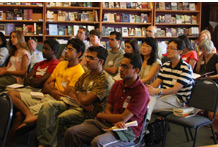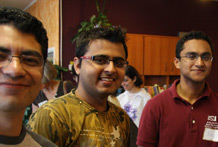In August 2006, International Bible Church (IBC) in Tempe, Arizona, USA, held its first official service. Twelve of us met in Quo Vadis, a Christian bookstore located a stone’s throw from Arizona State University (ASU). Our goal was, and still is, to reach the world’s future leaders.
|
|
The neighborhood surrounding the bookstore, where our church continues to meet every Sunday, was deemed by the 2000 U.S. Census as the most densely populated and most diverse in Arizona. The area covers only about one-eighth of a square mile, but is home to more than 3,100 residents which is equivalent to about 26,000 people per square mile—a population density comparable to that of New York City. Within the small area there is a broad range of ethnicities. Our church mirrors the neighborhood, with more than fifteen nations represented in our group of about forty to fifty people.
Many of the international students who study at Arizona State University are among the brightest and best from their respective countries. Some return home to hold powerful positions of influence in corporations, universities, or government. The leadership of IBC aims to communicate God’s transforming gospel to the next generation of leaders so that they will use their influence to bring God’s message to their home nations.
Most of the international students who attend IBC are graduate students with demanding academic schedules and rigorous study habits. They enjoy learning, discussing, and investigating. Some even view attendance at our church as a mere cultural experience—a pleasant augmentation to their American education. The challenge, then, is to communicate the gospel in a way that leads to transformation rather than just the addition of more head knowledge. But how can this be done with such gifted and highly trained intellectuals? How can the church leadership help make that connection between the mind and the heart?
The Inquisitiveness of Weimin
I still remember how excited our core group of believers was when Weimin,* a student from China, said, “China needs this,” after listening to a message about God’s love and the importance of treating all peoples with respect. One day Weimin observed that people in China didn’t care for one another. If they did, the whole nation would be transformed. The next day, Weimin took part in a square dancing event hosted by one of ASU’s Christian student organizations. Also in attendance was a group of pilots-in-training from China. When Weimin heard about the pilots, he seemed intrigued. After the event, my husband asked Weimin if he had talked with any of the pilots and Weimin responded, saying, “To be honest, they’re not very educated so I don’t really have any interest in talking with them.” The message of God’s love still had not penetrated Weimin's heart. ![]()
Intellectually, the idea of loving others made sense to Weimin. If people treated one another with kindness and respect, the world would be a better place. Less war, more peace—who wouldn’t jump on that bandwagon? But Christianity is not just a collection of ideas to be debated and studied; Christianity is a way of life. That is why the Apostle Paul talked about believers as the Body of Christ (1 Corinthians 12:27). Non-believers must understand that Christianity is not simply a “religion,” but an experience of the Body of Christ. That means including non-Christians in what we do as Christians. That means loving them even when they vehemently disagree with us, as was the case with Yujin.*
The Transformation of Yujin
Yujin, a visiting scholar from China, joined our weekly services, but always sat in the back with her arms crossed beneath a deep scowl. From the outset, she made clear her Communist beliefs and never hesitated to question a speaker after the service ended. She debated, argued, and became incensed. And yet, she kept coming back.
|
|
Believers in the church embraced Yujin. They invited her over for dinner and included her in holiday celebrations. At Christmastime, Yujin joined various groups to help serve meals to the homeless, give presents to needy children, and sing carols to the elderly. And as our small group of believers watched and prayed, Yujin began to transform. Gone were the crossed arms and the deep scowl. Gone was the combative spirit. She still had many questions; however, there was a gentleness about her that hadn’t been there before. She was somehow softer, as if something was wearing away the hard edges in her life.
On Yujin’s last Sunday with our church, we gave her a send-off. As she came forward to be prayed over and to receive a gift, tears filled her eyes. And the next day she returned to the bookstore for one last goodbye. She gazed over the bookstore and said, “I just have so many warm memories from this place.” What a testimony to the Body of Christ!
God is pursuing Yujin. She returned to China a different person. She also returned with the name of a Christian pastor written on a piece of paper. Her journey is not over.
Yujin heard the truth of God’s Word preached every Sunday; however, she also saw it lived out on the days in between. Those of us in leadership positions at IBC know that students watch us closely. They want to know if we believe what we preach. They want to know if what we say on Sunday matches what we do on Monday. They want to see if Christianity is the answer to a broken world. They want to know if it is just a “Western thing” or if it transcends ethnic and cultural lines.
Teaching the gospel is paramount. People must know who God is and what he says. But as James said, “What good is it, my brothers, if a man claims to have faith but has no deeds? Can such faith save him?” (James 2:14). Actions always stem from beliefs and if we, as leaders, claim to follow certain beliefs, our actions must be in alignment. ![]()
The Lessons of Sun
I was particularly challenged by Sun,* a Korean student, whom I had the privilege of discipling for a few months before she returned home. Our relationship grew quite close as we spent time together both studying the Bible and at various social events. In every situation, Sun’s first thought was for other people: What did they enjoy doing? Were they comfortable? Did they need anything? Could she help in any way?
Her commitment to the needs of others convicted me. I was the Christian, but she, as a non-believer, was the one successfully living out the biblical principle of unselfishness. During one of our Bible studies, Sun commented about the selfishness of Americans. Her observation opened the door for me to acknowledge my own selfishness and to share how God had used her to teach me about thinking of others more. It was a humbling experience; however, if humility is to be a mark of a Christian, what better way to teach the principle than to let God use my weakness for his glory?
By God’s grace, we can communicate the gospel to the leaders of tomorrow. We can display God’s glory through our words and actions. To do so we must walk in integrity and truth. We must also walk in humility, confessing our mistakes and forgiving one another. If we are faithful in our leadership, the next generation will hear and see the message of redemption and, by God’s grace, they will be changed.
*Name changed to protect identity.



